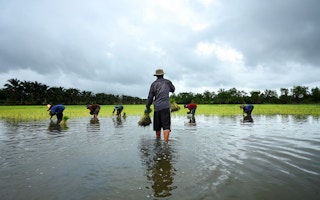Hong Kong is known as a “food heaven”. The diversity and quality of restaurants are among the world’s best, with an ever growing number of celebrity chefs and Michelin-starred restaurants. The abundance of food choices makes it a rare occasion for us to think about the bottom of the value chain – where these rice, vegetables and fruits come from, and even rarer to think about farmers, let alone smallholders, which are the communities that produce most of the food consumed worldwide.
Agriculture in Asia is characterized by smallholders (marginal farm households that own or cultivate less than two hectares of land according to the definition of the Food and Agriculture Organization of the United Nations). It is estimated that over 80 per cent of the world’s 500 million small farms are in Asia Pacific region.
Most of these farmers are living in remote villages and are geographically scattered, with limited access to modern farming technology, services and information. The nature of many modern agricultural value chains has actually created additional barriers for smallholder farmers to improve their livelihood.
For example, the profit margins for smallholder farmers are increasingly squeezed because of the involvement of multiple intermediaries in the agricultural value chain. Moreover, many countries in Asia have been the hotspot of climate change impacts and increasingly frequent extreme weather events, floods and droughts are adding to the challenges faced by farmers.
At one end of the value chain, these barriers pose significant challenges to individual farmers. At the other end, the question is brought to the private sector, including the big brands that we see in supermarkets and restaurants: what is the role that these companies can play to change the scene?
Here the role of companies is not about “doing good” – it is more about recognising the responsibility and real business case associated with engaging with farmers along the value chains.
It has been well recognised from the experience of companies such as Nestlé and FrieslandCampina that inclusive business interventions can increase the efficiency and competitiveness of businesses, as well as create a more secure supply chain.
It is worth noting that business opportunities not only lie in those companies that procure agricultural products from smallholder farmers: smallholder farmers also have their own demands – they need more inclusive financial services, more efficient small-scale resource management tools, as well as more convenient communication platforms to access information and enhance their agricultural practices, which brings in opportunities for companies in the IT and financial industries to empower smallholder farmers and transform the agricultural value chains.
In recent years, we have seen more and more companies starting to address the challenge of engaging with smallholder farmers through inclusive business models. However, there are still millions of smallholder farmers whose needs are yet to be met. As such, we have identified some directions that businesses can consider when trying to develop more inclusive business models along agricultural value chains.
“
It has been well recognised from the experience of companies such as Nestlé and FrieslandCampina that inclusive business interventions can increase the efficiency and competitiveness of businesses, as well as create a more secure supply chain.
Long-term partnership with smallholders
A first step is to engage with smallholders, identify their needs and enter into direct, long-term partnerships with them. On one hand, this liberates the farmers from being deprived of incomes by intermediaries. On the other, a long-term partnership helps companies secure a more stable supply chain and also ensures that their investment in smallholders’ capacity building will pay back.
As can be seen from Nestlé’s experience in supporting the development of dairy farmers across Asia, through helping farmers enhance their farming technology and skills, companies can also benefit from improved productivity and product quality to meet market demands.
Think of smallholders as consumers
When we consider smallholder farmers as individuals with less than two hectares of land, the business opportunity might be small. However, if we consider them as a community of 100 million farmers, the market potential can be huge.
These are smallholder farmers that face the same challenges and share the same demand for affordable and accessible agricultural services. These can be financial inclusion products, knowledge sharing tools, logistical services and agricultural equipment and systems but adapted to a smaller scale.
For example, financial exclusion is a common barrier faced by rural farmers. These farmers often need to be paid in cash, which is coordinated by intermediaries charging commission fees and resulting in losses to the farmers.
YES Bank leveraged its connections with the self-help groups across the country to reach out to farmers and utilised its technology platform to provide rural farmers with an instant mobile payment solution, which on the other hand has helped it reach out to a larger base of customers.
“
From impact investors to policy makers, from agribusiness companies to farmers’ associations, everyone’s commitment and patience is needed to nurture a more sustainable agribusiness ecosystem that supports smallholder farmers and leaves none of them behind.
Empower smallholders with connectivity
In the age of smartphones and high-speed connections, smallholder farmers also don’t want to be left behind. Smallholder farmers are in need of real-time agricultural product pricing information, as well as agricultural knowledge and modern techniques.
Meanwhile, large companies have been facing the challenge of monitoring and engaging with their extensive agricultural supply chains. As most smallholders are located in remote villages, these barriers can hardly be tackled without the support of modern communication technologies.
This is where IT companies that have the capacity of building up communication and real-time monitoring platforms can tap into.
The development of inclusive agribusiness also requires different stakeholders’ involvement. From impact investors to policy makers, from agribusiness companies to farmers’ associations, everyone’s commitment and patience is needed to nurture a more sustainable agribusiness ecosystem that supports smallholder farmers and leaves none of them behind.
As an effort to engage with different stakeholders and enhance the understanding of inclusive business models in the agribusiness value chain, CSR Asia is running a half-day workshop on the 16th of February on inclusive business in agriculture and seafood in Manila as a side event to the Asia Inclusive Business Forum.
The workshop is organized in partnership with Oxfam, funded through the Gender Transformative and Responsible Agribusiness Investments in South East Asia (GRAISEA). To learn more about or register for the training, please contact Ms. Vicky Chan at Vicky.chan@csr-asia.com.
Bowen Gu is a Project Manager, CSR Asia. This post is reproduced from the CSR Asia blog with permission.


















